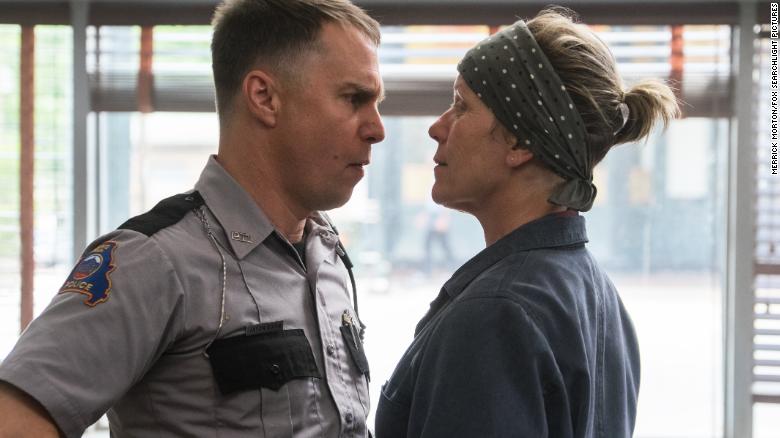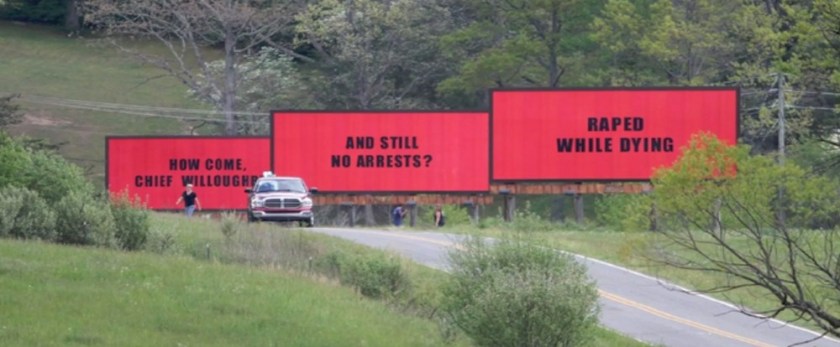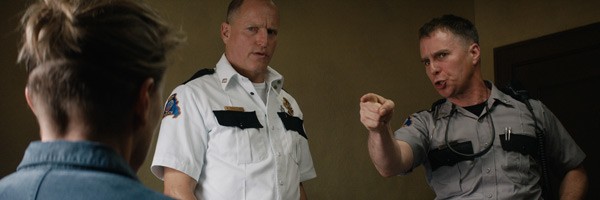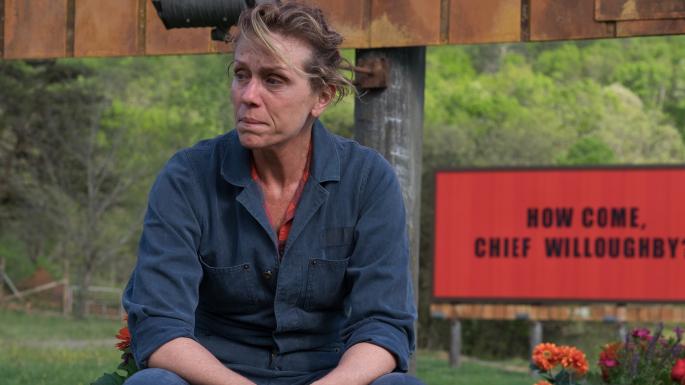
I find it fascinating that this movie is this year’s likeliest candidate to win Best Picture at the Oscars (it’s bagged the top prize at the Golden Globes, the SAGs and the BAFTAs), and that’s primarily for two reasons. Two reasons why this movie is pretty unique.
Just a good story
The first is the fact that this is not a story about any hot topic necessarily, and it’s not necessarily topical. It definitely weighs in on such social issues as racism in America, sexual violence, police brutality and accountability, and such individual issues as loss, closure and even parenting – but it is not singly or even primarily oriented towards any of them. Sure, most movies that are celebrated for being ‘about‘ any of those themes aren’t necessarily oriented or intended to be about those things, and even this movie is being celebrated for shedding light on a variety of current-day social issues, but as compared to all those other movies, Three Billboards belongs to the rare category of just being a story. A good, intricate, delicious story; no fucks given beyond that.
Great movies at the Oscars aren’t always known for being great stories – at least in my experience of having been an Oscars junkie the past ten years. Get Out, Moonlight, Fences, Hidden Figures, Selma, 12 Years a Slave, Django Unchained, The Help, The Blind Side, Precious – they all share in common the thoughts and conversations they evoked on race and America’s chequered history of dealing with it (though again, many of these movies are much more than just that). The likes of Slumdog Millionaire, The Reader, Milk, The Kids Are All Right, Dallas Buyers Club, The Imitation Game, The Theory of Everything, Room, or Lion are special in no small part because of the impressions they left on our minds about sexuality, culture, ethnicity, womanhood, disability and the like. Then there’s the staple movies about war or great political/public moments (especially in the American context): Dunkirk, The Post and Darkest Hour in this year alone, and Hacksaw Ridge, Bridge of Spies, The Big Short, American Sniper, Zero Dark Thirty, Argo, The Social Network, Inglourious Basterds, The Hurt Locker, Frost/Nixon in the past ten years.
More often than not, the movies we celebrate the most are so celebrated for a variety of reasons, among which their ‘story’ may not always be the biggest reason.
On Three Billboards Outside Ebbing, Missouri, however, one of my first thoughts after watching the movie was how it is ‘just a story’, and how good it is at being just a story.
It painstakingly builds the characters, their preoccupations and motivations, their struggles – and then lets them collide. Everything else is just a bonus.
It’s the story of a mother who “goes to war” against the local police department, when she puts up three billboards outside her small, sleepy, fictional town, demanding action by the police in the rape-and-murder case of her daughter. How this decision of hers sits down with two cops, as well as her family, makes up the plot. And boy, what a plot it is.

Winning the plot
This is the second reason Three Billboards is unique in, at least, recent Oscar history. Not only do we have fewer movies where the main takeaway is the great story, we have even fewer that are so plot-driven. I, for one, have always felt that the movies considered the best of the year are overwhelmingly character-driven. I certainly don’t remember many of them having the kind of twists and turns that make up Three Billboards. Each of the characters are gloriously interconnected by that long arm of circumstance which, when wielded by minds like those of writer-director Martin McDonagh, leads to the most rich stories.
The chief cop who regrets not having found Mildred’s daughter’s killer, but has terminal cancer, and fears more the regret he would feel if his family had to see him wither away in his last days (Chief Willoughby / Woody Harrelson). The sidekick who is impulsive, violent and otherwise pretty dumb (Dixon / Sam Rockwell). The ex-husband who may have beaten Mildred, now dates a pretty 19-year-old (who is also pretty dumb), and cannot stand the billboards (Charlie Hayes / John Hawkes). The advertising agency man who agrees to put the billboards up, and then agrees to stand up to the police… till aforesaid sidekick leaves him in a state that he can barely stand up at all (Red Welby / Caleb Landry Jones). The ‘town midget’ who fancies Mildred and decides to help her out (James / Tyrion Lannister). And the mysterious man from Idaho who’s passing through town, and is “someone’s rapist, even if not our rapist”.
These are the pieces.
And what’s moving the pieces, is anger. Really speaking, that is what this story is primarily ‘about’: anger. It may be just a story, but the premise of the unsolved rape and murder of a young girl in a small town ends up displaying an unravelling of the human beings at the centre of the story – who are all angry at one thing or the other.
Anger begets more anger
Mildred goes from ‘grieving mother using a unique method of protesting’ to ‘angry woman whose billboards were burnt by presumably the police (um, nope) so she has now decided to “crucify those fuckers” by molotov cocktailing the entire police station to hell’, and finally to ‘all hope is gone but still no closure so for some reason I find myself on a road trip to murder a guy who may have raped and killed a girl, not even my girl’.
Dixon is shown to be angry from the very beginning, having tortured a black guy in custody in the past (though, there was never “any REAL evidence to support that claim”, and also, “it’s ‘persons of colour torturing’, you can’t say ‘nigger torturing’ no more”). Turns out he has been a little unhinged ever since his father died and he had to take care of his mother on his own. He reads comics at the police station, and can’t figure out where his badge is. Never did well at school. A child who had to grow up too soon, and whose sense of discretion as a police officer translates pretty much only to beating the crap out of whoever he thinks is a problem.
And so, Three Billboards works great as a deconstruction of anger, and what makes us resort to violence. It could be injustice, feeling like you’re not being heard (Mildred). It could be struggling with letting go of a more carefree, simpler world in which you didn’t have to be all smart and responsible all the time (Dixon). An important part is even when someone has crossed the threshold and taken up violence, they may only intend to be ‘proportional’ in their response, but of course, the very nature of violence means that it is not within their hands; Mildred sets fire to the local police station, but is aghast at a burning Dixon crawling out of the flames – more so when she realizes he had been trying to protect her daughter’s case file from getting destroyed. Then there’s the darkly beautiful misdirection that comes with anger. Dixon loses yet another father figure when Chief Willoughby kills himself, so Dixon beats the living crap out of Red and throws him from his office building, even though it is probably Mildred who Dixon is really mad at.
All of this culminates in that last scene, where both these opponents-in-the-story-and-proponents-of-violence take up arms together and go after a guy they know is not the culprit. “He’s not your rapist, but he is someone’s rapist”, Dixon says to Mildred – both human beings at rock bottom. Because in the end, most human stories are about that biggest human limitation of all – the search for what we cannot find, and what it makes us do, how it consumes us. Mildred’s looking for justice and to redeem herself, Dixon to set himself right and make his late Chief proud – and an unconnected, possible-rapist may have to die for them to get what they want. Or will they get what they want? Meh, they’ll decide on the way.
Tragedy + No time = Still comedy
You cannot walk away from this movie without noticing its unique black humour. It’s not the subtle kind of funny of a Phantom Thread or the “Er, awkward” kind of a The Big Sick. No sir. Three Billboards is laugh out LOUD funny. And oh how well the humour is interlaced with the serious and thoughtful moments. About two minutes after Dixon declares proudly “SHE SAID “nigger torturing”. I SAID you can’t SAY “nigger torturing” no more. You gotta say PERSONS OF COLOUR TORTURING!!“, Chief Willoughby coughs up blood directly into Mildred’s face. It’s not too long after Willoughby commits suicide (did NOT see that coming) that Dixon is shown having the time of his life listening to some joyous as fuck music on his earphones, blissfully unaware of his fellow cops mourning around him. Mildred has a fascinating love-hate relationship with each of her family members, especially her son Robbie (Lucas Hedges, who infuses the few frames he occupies with a presence and a pain that show you why he really is the force we know him to be from last year’s Manchester By the Sea). There is a scene involving rice crispies, Mildred’s ex-husband and a 19-year-old wanting to pee that is to be seen to be enjoyed, and nicely summarises the rhythm this screenplay has of following pain with silliness.

Movie violence done right
A word also about the movie’s fantastic use of violence – in line with Nerdwriter’s utterly brilliant thoughts on it. The movies uses violence as the evocative tool in storytelling that it’s supposed to be: by making it sudden, and awkward, and so very visual. See: The blood splotch on the wall from a thrown syringe, the drill driven into the menacing dentist’s thumb, and finally, the skull-cracking escapades of Dixon’s little trip to Red Welby’s offices (the camera movement and sound mixing on that last one were fantastic, by the way). Oh, and the movie doesn’t spare women. Now of course, this is a subject worth debating, and may not necessarily be a good thing simply in terms of social desirability in the year 2018. But speaking only in terms of what violence can achieve in cinematic storytelling by its abruptness and visual motifs, Mildred the mom kicking a girl ‘in the nuts’ for possibly bullying her and her son… is pretty absurd, and pretty funny, and does the job.
But neither the unique humour nor the unique violence would have hit their marks if not for the truly special performances. To anyone who’s seen the movie, talking about the performances would be such a tired and redundant exercise, that I’ll keep it short: Frances McDormand is a force of nature. Though Mildred Hayes shows more than a few shades of Olive Kitteridge (a deeply brilliant and human show, and highly recommended), the cocktail of ferocity, badassery, pain and vulnerability McDormand has us consume is only possible because this is, really, acting at its best. I won’t forget in a hurry Mildred howling “ROBBIEEEE!!!” as the billboards burn.

But then Sam Rockwell’s turn as the clown/dickhead turned kinda-savior is even more interesting to watch unfold. It’s not easy to act funny when funny is far from the story you’re inhabiting; you’re not a clown or comic relief in the narrative, you’re part of it and your actions need to come across as organic – and Rockwell does all that with flying colours. Woody Harrelson makes the most of his time, though the finest moment of his performance is probably when he reads out his suicide letters. And a word also for my man Lucas Hedges. His voice quivers in the slightest as he recalls his sister’s death and sulks at his mom, “Thanks for the detail, ma. Raped whi-ile dying”. One small touch like that. And I have my hands covering my mouth. Manchester by the Sea, Lady Bird, and now Three Billboards. God bless his journey.
What a strange Best Picture, ladies and gentlemen
It may not stand out that way, but Three Billboards really is a unique movie. The premise has been used to show us and share with us so much more. What was the need for Chief Willoughby’s character to have cancer, or to even exist, much less kill himself? What was the need for that scene with a beat-up Dixon’s mother howling for him to open the door and let her in? This is the kind of ecosystem-building stuff that you see when a story cares just about telling itself, and not about some larger ‘purpose’. And the story itself is all in the service of driving home exactly how messy things can get when people do not have closure and are full of anger.
And boy does the world today lack closure and is full of anger.
One thought on “The Best Films of 2017: “Three Billboards Outside Ebbing, Missouri””